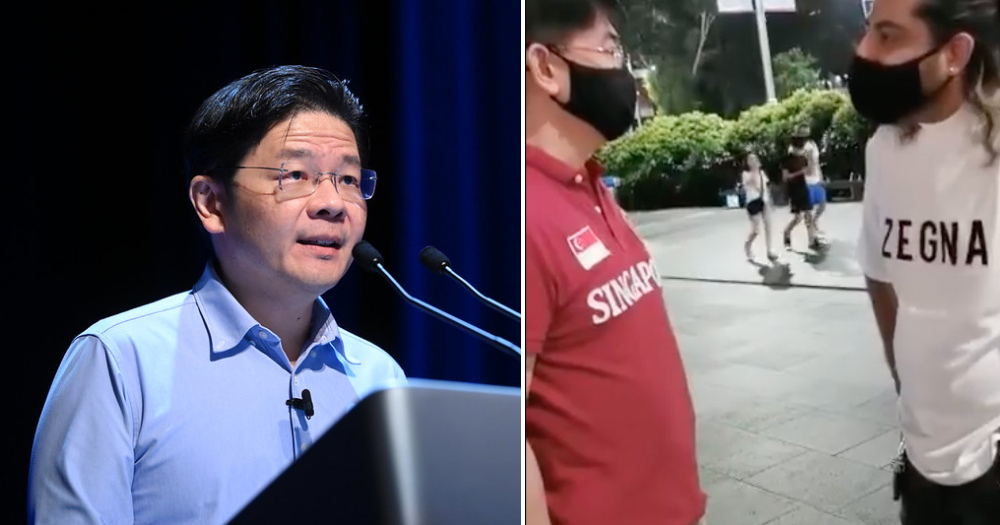Finance Minister Lawrence Wong said that the government will continue to engage communities and adjust Singapore policies on racial issues, but also said that previous policies have helped to make progress.
Highlighting that race is never an easy issue in any society, anywhere, Wong delved into the history of Singapore's multi-racial society during the Institute of Policy Studies (IPS) and S. Rajaratnam School of International Studies (RSIS) June 25 forum on race and racism.
As Wong said, Singapore's multi-racial society was crafted through deliberate and carefully thought out policies by the country's founders, such as making English, a neutral language, the common language here.
Working towards a more multi-racial society
Despite the progress Singapore has made, Wong acknowledged that not everything is perfect. He referred to a number of racially-motivated attacks and confrontations that have recently grabbed headlines.
On May 7 earlier this year, a Chinese man allegedly kicked an Indian woman in the chest while uttering racial slurs.
A Malay woman was sentenced to jail on June 23 for hurling racist slurs at an Indian bus passenger.
On June 5, a Chinese man lambasted an interracial Indian-Chinese couple, saying it was a "disgrace" and said Indian men in such relationships were "preying" on their partners. The man was later identified as Ngee Ann Polytechnic lecturer Tan Boon Lee and was subsequently fired from his job.
Also in the same month, a Chinese woman was filmed banging on a gong while an Indian man was conducting a Hindu prayer, allegedly to disrupt what he was doing. Police investigations are ongoing.
Hence, Wong put forth a few suggestions on how to "reduce our imperfections".
Mutual trust needed, communities are not monolithic
Difficulties experienced by minorities
Wong pointed out that something to be recognised was the difficulty of being a minority, as compared to the majority.
The majority community in Singapore thus needs to be "sensitive to and conscious of the needs of the minorities".
This is key even in daily life, as racism manifests itself in micro-aggressions, such as when someone faces discrimination while looking for a job, or landlords who do not prefer tenants of a certain race.
"These things do happen, not always, and perhaps not even often, but sometimes they do. And when they do happen, they cause real hurt, which is not erased by lightly dismissing them as casual remarks or jokes," Wong said.
Wong thus urged for the majority community in Singapore to take extra steps to make their minority friends, neighbours, co-workers feel comfortable — to treat others the way one wants to be treated.
Chinese community is not monolithic
At the same time, Wong highlighted that the Chinese community is not monolithic and should not be generalised.
Despite Chinese people being the majority in Singapore, he noted that there is a "whole generation" more comfortable in using Chinese than English, and consider themselves at a disadvantage.
These individuals, Wong said, also might not consider themselves part of the group that has "Chinese privilege".
Mutual trust is needed
As a result of these varied experiences and situations, Wong added that mutual accommodation, trust and compromise is necessary.
Minority individuals should be upfront and honest about their racialised experiences in order to spark uncomfortable, but necessary and civilised, discussions.
Wong clarified that this does not mean that these individuals should refrain from voicing out their unhappiness.
However, people should also avoid putting their own community or group above others, or "construe every compromise as an injustice that needs to be condemned, or put the worst interpretation on every perceived slight or insensitivity".
He said this may result in groups "jostling" against each other, using identity politics and focusing on differences over similarities.
Ultimately, Wong emphasised three broad ways to move forward:
- Expand the space for agreement, not narrow it.
- Deepen cross-cultural understanding, not cause defensiveness and suspicion.
- Appeal to the better angels in all of us, not instigate a “them vs us” dynamic.
Policies can always be changed and improved
Wong continued that the government will persist in their move to engage widely, and update their policies on race, as well as policies to strengthen racial harmony.
He reiterated that their policies "are not cast in stone", and mentioned some examples such as GRCs, Special Assistance Plan schools and HDB's Ethnic Integration Policy.
"We continually ask ourselves, what is it we are trying to achieve? Is the policy still relevant today? Can it be further fine-tuned or improved?" he said.
However, Wong also defended the GRC system, saying that Singapore is not yet immune to "calls of exclusive racial and cultural identities", and therefore it is needed to ensure minority representation in Parliament.
But Wong pointed to one policy the government is currently reviewing, which is the use of the tudung for Muslim nurses.
This came after a lengthy discussion in Parliament between parliamentarians from both aisles, where Workers' Party Member of Parliament Faisal Manap made a call to allow nurses to wear tudungs.
Minister-in-charge of Muslim affairs Masagos Zulkifli revealed that the government was reviewing the issue, and that it hoped to make an announcement by National Day.
Wong added that the review process is a measured and extensive one. "It cannot be rushed, nor should things be changed simply based on who shouts the loudest," he said.
Instead, these changes should "expand our common space... while allowing each community as much room as possible to go about its way of life."
Top photo from Jacky Ho, for the Institute of Policy Studies and Parkash / FB.
If you like what you read, follow us on Facebook, Instagram, Twitter and Telegram to get the latest updates.
